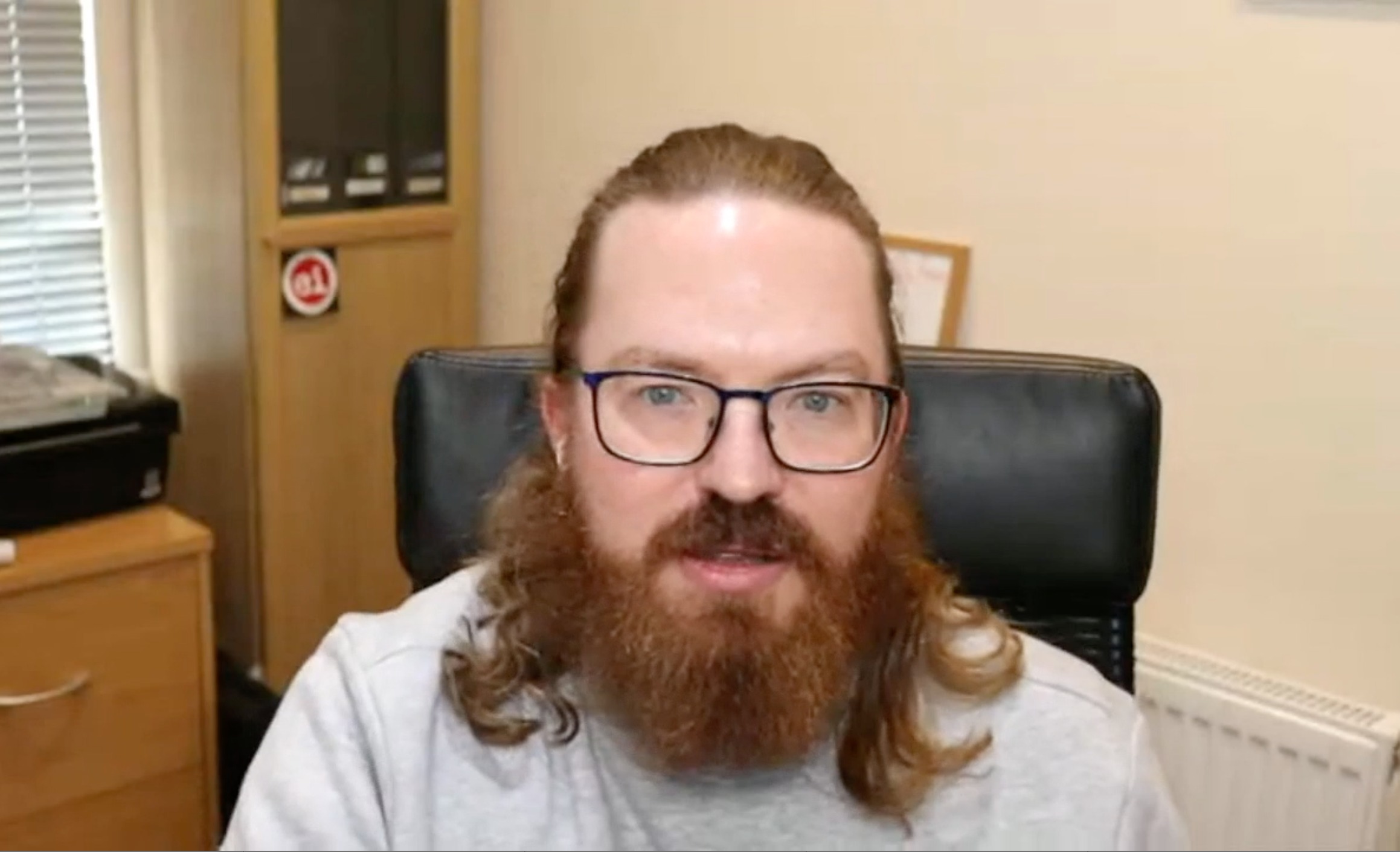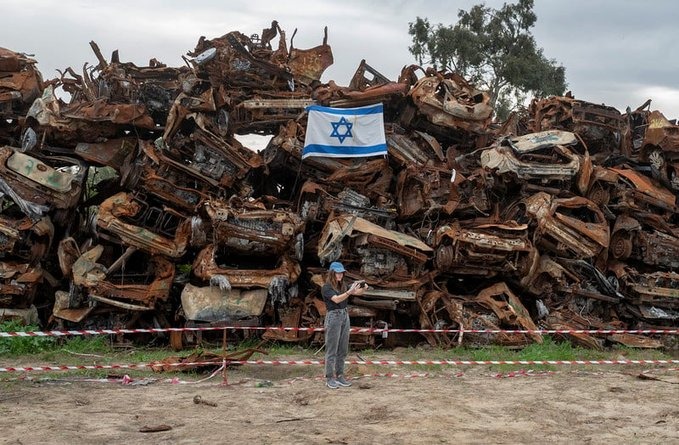In a significant escalation of the UK’s use of counterterrorism laws against journalists, British police raided the home of Asa Winstanley, associate editor of The Electronic Intifada, in North London on the morning of October 17.
Around 10 officers from the Metropolitan Police’s Counter Terrorism Command arrived at Winstanley’s home before 6 a.m., armed with warrants allowing them to search his house and vehicle. Multiple electronic devices were seized during the operation, although Winstanley has not been arrested or charged.
The raid was conducted as part of “Operation Incessantness,” and Winstanley was handed a letter stating that authorities were “aware of your profession as a journalist” but were investigating possible offenses under sections 1 and 2 of the UK’s Terrorism Act (2006). These provisions relate to the “encouragement of terrorism,” a charge that Winstanley’s social media activity allegedly falls under. Despite attempts to reach the Metropolitan Police for comment, no further information has been provided regarding the ongoing investigation.
Winstanley, an outspoken critic of Israeli policies in Palestine, is known for his investigative journalism, much of which focuses on British complicity in the Israeli occupation and apartheid system. His social media presence, with over 100,000 followers on X (formerly Twitter), has been a platform for sharing his views on Israel’s actions in Gaza and British support for Israeli policies. One of his most recent articles, How Israel killed hundreds of its own people on 7 October, investigated the Israeli military’s use of the Hannibal Directive, which reportedly allowed Israeli forces to kill their own citizens rather than allow them to be captured by Hamas.
Winstanley’s work extends beyond journalism. He is the author of Weaponising Anti-Semitism: How the Israel Lobby Brought Down Jeremy Corbyn, a book examining the influence of pro-Israel lobbyists on UK politics. His reporting has also highlighted the increasing use of counterterrorism laws to silence journalists and activists critical of Israel. In December 2023, he covered the arrests of prominent activists Mick Napier and Tony Greenstein, who were targeted by police for expressing support for Palestinian resistance.
Broader Pattern of Suppression
The raid on Winstanley is part of a broader crackdown by the UK government on journalists and activists reporting on Palestine. Richard Medhurst, another British journalist, was arrested in August 2024 upon arrival at Heathrow Airport. Detained under the Terrorism Act (2000), Medhurst had his phone and recording devices seized, raising concerns about the growing use of anti-terror laws to target reporters. Similarly, Sarah Wilkinson, a human rights activist with a large social media following, had her home raided by counterterrorism police later in August. Like Winstanley, Wilkinson was reportedly targeted for content she had posted online.
Human rights groups and press freedom advocates have raised serious concerns over these developments. Human Rights Watch has called for the repeal of the repressive provisions of the Terrorism Act (2006), stating that the law’s vague definitions of “encouragement of terrorism” can easily lead to undue restrictions on free speech. University of Edinburgh law professor Andrew Cornford has echoed these concerns, warning that the legislation “curtails a range of freedoms, including the ability to discuss controversial topics openly and to share political opinions.”
In response to Winstanley’s raid, Ali Abunimah, director of The Electronic Intifada, expressed full support for his colleague, stating that the raid was an attempt to intimidate and silence journalists critical of Israeli policies. Abunimah also noted that The Electronic Intifada would continue to report on British complicity in Israel’s crimes with increased determination.
Press Freedom Under Threat
The increased use of counterterrorism laws to target journalists has alarmed press freedom organizations. Michelle Stanistreet, general secretary of the UK’s National Union of Journalists (NUJ), and Anthony Bellanger, general secretary of the International Federation of Journalists (IFJ), have jointly condemned the raids. “Journalism is not a crime,” they emphasized, adding that the powers granted under anti-terror legislation must be used proportionately and not to stifle critical reporting.
Winstanley’s case is emblematic of the challenges facing journalists covering the Israeli-Palestinian conflict. The use of anti-terror laws to suppress their work is part of a broader trend in which governments are increasingly using legal mechanisms to control narratives around contentious issues. The UK’s ruling Labour Party, led by Sir Keir Starmer, has been criticized for continuing to use laws first introduced under Tony Blair’s government to suppress dissent. Many fear that this pattern of silencing critics of Israel will only intensify under the current political climate.
Solidarity with Asa Winstanley
Despite the attempts to silence him, Winstanley remains committed to his work. His colleagues and supporters have rallied around him, calling the raid a blatant effort to suppress free speech. Craig Mokhiber, a human rights lawyer, described the UK government’s actions as a violation of its obligations under international human rights law, warning that these authoritarian measures must be stopped.
As pressure mounts, advocates for press freedom are calling for reforms to the UK’s counterterrorism laws and a re-examination of how they are applied to journalists. The raid on Winstanley’s home has sparked widespread concern over the future of free expression in the UK, particularly when it comes to reporting on Israel-Palestine relations. Nonetheless, The Electronic Intifada and Winstanley’s supporters are determined to continue their work, undeterred by the state’s attempts at intimidation.
Winstanley’s raid is likely to have lasting implications for the press, as it raises urgent questions about the limits of state power and the importance of safeguarding freedom of speech in democratic societies.
—
UPDATED FROM ASA WINSTANLEY’S INTERVIEW WITH CRISPIN FLINTOFF
Investigative journalist Asa Winstanley, known for his work on Middle East issues and reporting on the Israeli-Palestinian conflict, has spoken out following a raid on his home by the UK’s counter-terrorism police. The raid, which took place early in the morning, involved around 10 officers and lasted for approximately three hours, during which Winstanley’s electronic devices were confiscated.
Speaking to reporters the day after the incident, Winstanley described the raid as “terrifying.” The police arrived at his residence at around 5:40 AM, ringing the doorbell and forcing their way inside. “They barged into the house,” he said, recalling the unsettling moment when the officers entered. “It was quite terrifying.”
The counter-terrorism unit seized Winstanley’s work devices, including his computer, phone, and other tools essential for his journalism. “They took away all of my devices that I use for my work as a journalist,” he stated. The confiscation of his equipment, Winstanley believes, is an attempt to stifle his reporting. He highlighted that the officers made it clear they knew he was a journalist, but did not specify which social media posts had triggered the raid.
“They didn’t charge me with any crime, or even arrest me, and yet they still are able to take all this stuff,” he remarked, voicing his concern over the apparent lack of legal basis for the confiscation of his belongings.
Winstanley, a journalist for The Electronic Intifada, is known for his coverage of Israel’s actions in Gaza. He suggested that the raid is part of an ongoing effort to intimidate journalists who report on the conflict. “It seems like nothing but harassment and a way to stop journalists who are reporting on what is the Holocaust of our times,” Winstanley said, referring to the ongoing violence in Gaza.
Reflecting on the broader implications of the raid, Winstanley stressed the psychological impact of such actions. “It’s something that has a psychological impact, and I think that’s part of the intended effect,” he said, adding that the authorities were targeting not only his equipment but also his ability to continue his work.
Despite the ordeal, Winstanley remains defiant. He expressed gratitude for the support from his colleagues and vowed to continue his investigative journalism. “I will be back, and I will be back stronger than before,” he said.
The raid has raised alarm among press freedom advocates, who see it as part of a disturbing trend of targeting journalists in the UK. Winstanley, whose work often challenges official narratives, noted that the authorities’ actions seemed aimed at silencing dissenting voices.
The National Union of Journalists (NUJ) has expressed its support for Winstanley, and further statements are expected. Meanwhile, Winstanley is preparing to resume his work once he is able to replace his confiscated equipment.
The incident has sparked a wider debate about the treatment of journalists in the UK, particularly those covering controversial subjects. As Winstanley put it, “We wake up every morning to new reports of atrocities in Gaza, and instead of addressing the issue, authorities are punishing the people trying to expose the truth.”
Winstanley’s equipment remains in police custody, and while he was told it would be returned, he remains skeptical about how long that will take. The raid marks a significant moment in the ongoing conversation about press freedom in the UK, especially in relation to coverage of sensitive international conflicts.




